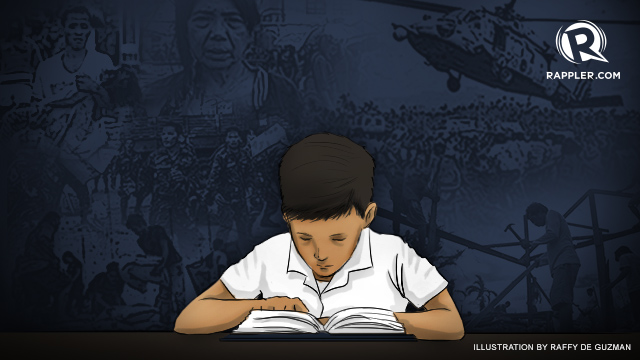SUMMARY
This is AI generated summarization, which may have errors. For context, always refer to the full article.
 As a former school teacher, I witnessed education’s capacity for socializing individuals into becoming good citizens. In teaching literature, I was always excited about my students using works such as “Noli Me Tangere” and “El Filibusterismo” to reflect upon broad principles of citizenship. It has also provided opportunities to impart skills necessary for participating in society. Moving from basic education teaching to lifelong learning research, I am convinced that education for citizenship must be conceptualized throughout the life span, enabling informed, productive citizens.
As a former school teacher, I witnessed education’s capacity for socializing individuals into becoming good citizens. In teaching literature, I was always excited about my students using works such as “Noli Me Tangere” and “El Filibusterismo” to reflect upon broad principles of citizenship. It has also provided opportunities to impart skills necessary for participating in society. Moving from basic education teaching to lifelong learning research, I am convinced that education for citizenship must be conceptualized throughout the life span, enabling informed, productive citizens.
This view is articulated by organizations such as the United Nations Educational, Scientific and Cultural Organization (UNESCO), which define citizenship education as training “clear-thinking and enlightened citizens who participate in decisions concerning society.” As such, this involves active citizenship skills including critical thinking, decision-making and moral judgment. The Citizenship Foundation UK clearly outlines the result of effective citizenship education – “citizens willing and able to take responsibility for themselves and their communities.”
Given this, I believe that current citizenship education in the Philippines remains limited at best. While we emphasize “Pinoy pride” through our heroes and role models, we still have to impart skills necessary for meaningful community participation. Aside from taking pride in our countrymen’s achievements, we also need to act upon our values such as bayanihan in the national arena.
Yolanda and K-12

A month after Yolanda slammed the Visayas, stories of death and devastation have slowly given way to narratives of hope and heroism. Nonetheless, we are also saddled with politicking and a lack of general preparedness.
I strongly argue that we strengthen citizenship education for participating in our local communities in terms of disaster adaptation. In making this argument, I identify 3 areas where citizenship education and disaster adaptation can come together in order to create general, lifelong preparedness: K-12 education, higher education and vocational training.
K-12 education, led by the Department of Education (DepEd), can begin citizenship education and disaster adaptation among the young. Subjects at the elementary level should be conceptualized in order to provide disaster adaptation skills. For example, while Science lessons can focus on dispelling misconceptions about natural disasters, English/Filipino lessons can provide pupils with skills to understand disaster-related instructions.
Citizenship Advancement Training (CAT) in high school should teach adolescents to become first responders in their families through inculcating skills such as basic first aid. Japan has led the way in preparing citizens for natural calamities through age-appropriate educational content. Average citizens – even children – rarely panic during emergencies. This is a realistic goal we can work for as a nation.
Higher education and disaster resiliency
Higher education can follow up on skills taught in K-12. For one, the National Service Training Program (NSTP) must be remodeled in order for college students to become community responders. Content such as advanced first aid, search and rescue, as well as survivor debriefing can be introduced in universities.
Students can also get involved in monitoring local geo-hazards, strengthening natural defenses such as mangrove forests, and engaging in relief/rehabilitation operations. These must be fully integrated with local government units and existing volunteer organizations.
Through the realignment of course content and building closer relationships among disaster management stakeholders, this is a feasible and low-cost option for the Commission on Higher Education (CHED) and university administrators. A number of Latin American universities have remodeled their courses in response to calamities, and we can do the same here.
Locally, the Psychology department in the University of the Philippines Diliman has ready expertise in debriefing survivors, and we can use this in designing relevant courses for our students nationwide.
Vocational training can provide practical skills that aid employment and collective adaptation. The Department of Labor and Employment (DOLE) and the Technical Education and Skills Development Authority (TESDA) can zero in on existing occupational health and safety measures, and include disaster response in workplaces as common content for all vocational modules. Supervisor training can also include crisis management skills.
The government can also create a market for disaster response professionals by formalizing qualifications, and ensure employment at the local and national levels. In Australia, the Queensland tourism industry has been in close contact with local authorities who prioritize disaster preparedness as an essential component of workplace safety. This can be replicated in the local tourism industry, considering its important place in our economic strategy.
Reinforcing current structures
It is worth noting that these do not entail creating new government bureaucracy or spending billion-peso funds. These initiatives actually build upon our existing structures but tweak them in response to our needs. It also strengthens the connection among components of our education system by introducing skills to be reinforced throughout life.
Citizenship education across the life span is conceptualized beyond political literacy, but also for disaster adaptation.
Indeed, if there is something that must rise after Yolanda, it must also be citizenship education. Now, more than ever, we need citizens armed with skills to respond to the greatest challenge facing our society – adapting to natural disasters.
Citizenship education can literally save lives, if we undertake the task of rebuilding our curriculum using Yolanda’s lessons as guide. With our choices as stark as life or death, this is a task we might as well undertake, for our children’s sake and ours as well. – Rappler.com
Patrick Alcantara finished his Masters in Lifelong Learning with distinction from the Institute of Education, University of London, and Deusto University under an Erasmus Mundus grant by the European Commission. His research interests fall broadly within lifelong learning, education policy and knowledge management. He was a school teacher before embarking on his Masters.
iSpeak is a parking space for ideas worth sharing. Send in your contributions to move.ph@rappler.com.
Add a comment
How does this make you feel?
There are no comments yet. Add your comment to start the conversation.